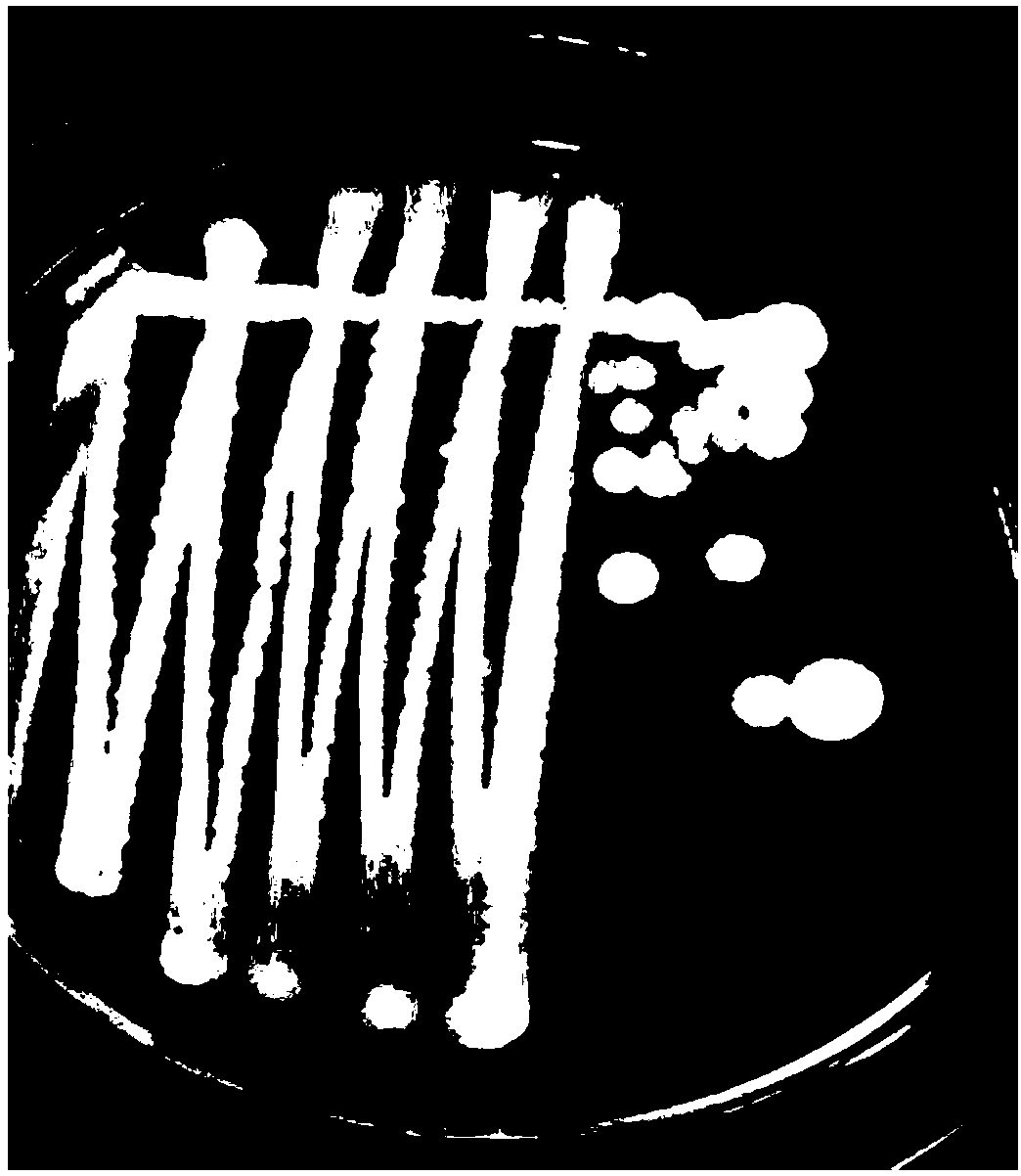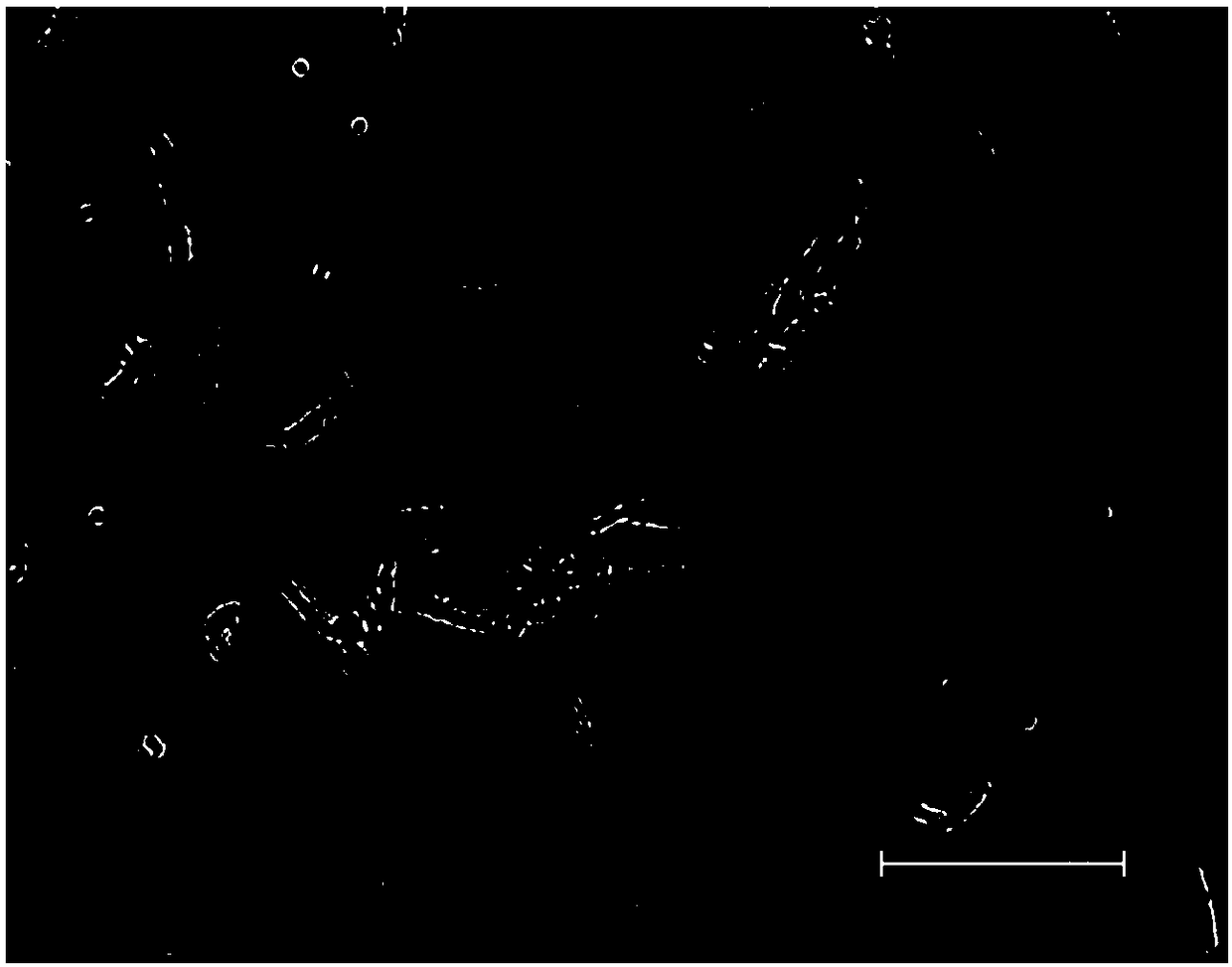Plant growth-promoting bacillus aryabhattai for heavy saline-alkali soil and application of PGPR bacillusaryabhattai
A Bacillus arborii and rhizosphere growth-promoting technology, applied in the field of agricultural and forestry microorganisms, can solve the problems of reduced salt tolerance, reduced plant rhizosphere biological activity, and lack of resistance to high salt, so as to promote growth and improve salt-alkali tolerance Ability, improve the effect of salt-alkali resistance
- Summary
- Abstract
- Description
- Claims
- Application Information
AI Technical Summary
Problems solved by technology
Method used
Image
Examples
Embodiment 1
[0023] Example 1 Screening, isolation and preservation of rhizosphere growth-promoting bacteria in heavy saline-alkali soil
[0024] Collect 6 samples of Tamarix rhizosphere soil in the Yellow River Delta. The bacterial isolate was separated from the rhizosphere soil sample by gradient dilution method. Purify the isolated bacteria by the three-zone streaking method, and judge whether the strains are purified by microscopy, number the purified bacteria, pick a single colony, and inoculate it on a skimmed milk medium plate with a sterilized toothpick. After culturing at 37°C for 2 days, select the colonies with transparent circle, measure the colony diameter d and transparent circle diameter D, and calculate D / d, select the larger ratio for purification and repeatedly verify the effect of protease production, select the stable functional strain for further Re-screening.
[0025] Folin phenol method is used for re-screening. Add 1 mL of the original fermentation broth to 2 mL of 0....
Embodiment 2
[0026] Example 2 Physiological, biochemical and molecular identification of rhizosphere growth promoting bacteria GPR018 in heavy saline-alkali soil
[0027] Colony characteristics and cell morphology: the colony is round and regular, the colony is large, the surface is convex, relatively moist, slightly yellow, opaque, the cell is small, rod-shaped, with spores, and its colony morphology is like figure 1 As shown, the optical microscope inspection is as figure 2 Shown.
[0028] Physiological and biochemical characteristics: positive contact enzyme test, positive citrate utilization test, negative starch hydrolysis test, negative VP determination test, negative D-glucose test, negative D-mannitol test, negative trehalose test, negative D-sorbitol test , Sucrose test is negative, glucose gas production test is negative.
[0029] Functional qualitative and quantitative determination: add 1mL of the original fermentation broth to 2mL of 0.5% casein solution, bath in a water bath at pH ...
Embodiment 3
[0034] Example 3 The salt tolerance of GPR018 and the growth-promoting effect in a heavy salt-alkali environment
[0035] 1. Salt tolerance
[0036] Choose 4 species of Bacillus asheri, namely Bacillus asheri BPR078 (the deposit number is (CGMCC No.11971), Bacillus asheri BPR088 (the deposit number is (CGMCC No.11972)), and Bacillus asheri JIA2 (the deposit number is (CGMCC No.11967) and the present invention’s Bacillus argentii GPR018 (preservation number is (CGMCC No.11973). The 4 long-producing strains were first inoculated into liquid LB medium, 180rpm, 37℃ constant temperature shaker culture 24h . Then take 200μL of activated bacteria solution to the sodium chloride concentration of 1%, 3%, 6%, 9% LB liquid medium, each gradient three parallel, and then placed at 180rpm, 37 ℃ constant temperature shaking Incubate in a bed for 24 hours, use a spectrophotometer, and take the corresponding medium without inoculation of the bacterial suspension as a blank control, take regular sa...
PUM
 Login to View More
Login to View More Abstract
Description
Claims
Application Information
 Login to View More
Login to View More - R&D
- Intellectual Property
- Life Sciences
- Materials
- Tech Scout
- Unparalleled Data Quality
- Higher Quality Content
- 60% Fewer Hallucinations
Browse by: Latest US Patents, China's latest patents, Technical Efficacy Thesaurus, Application Domain, Technology Topic, Popular Technical Reports.
© 2025 PatSnap. All rights reserved.Legal|Privacy policy|Modern Slavery Act Transparency Statement|Sitemap|About US| Contact US: help@patsnap.com



